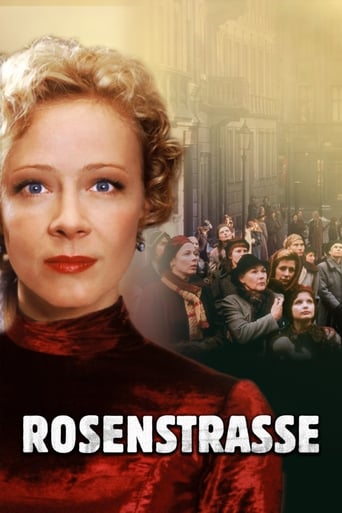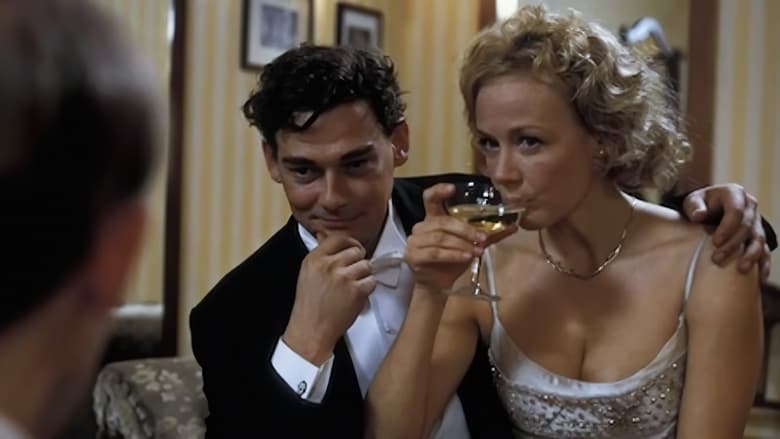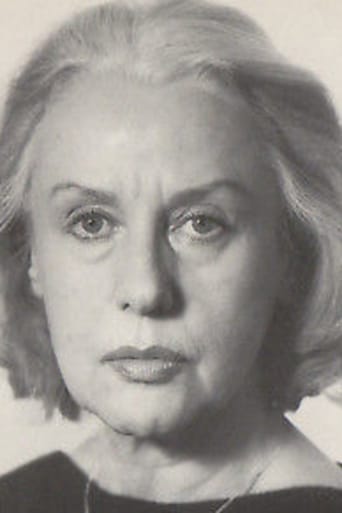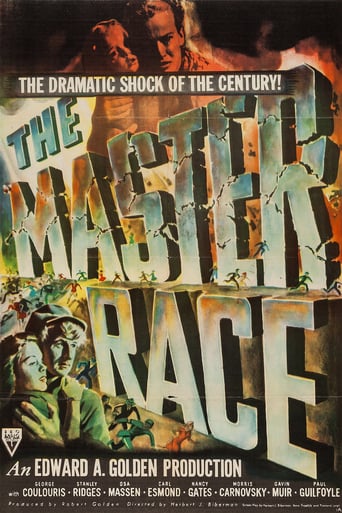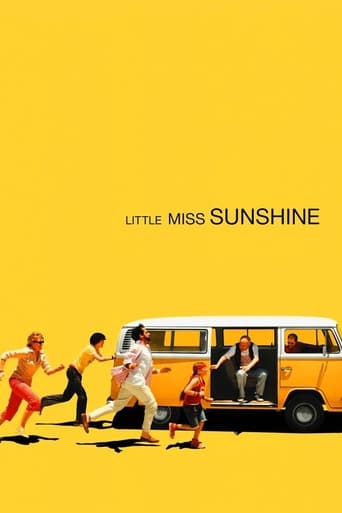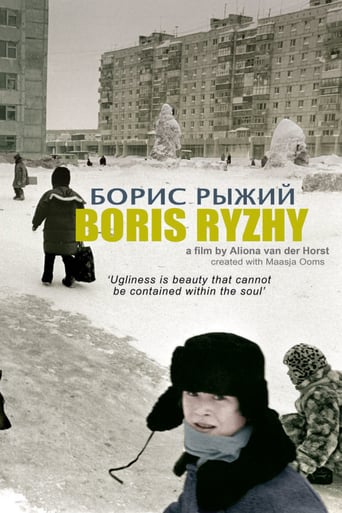Rosenstrasse (2003)
When Ruth's husband dies in New York, in 2000, she imposes strict Jewish mourning, which puzzles her children. A stranger comes to the house - Ruth's cousin - with a picture of Ruth, age 8, in Berlin, with a woman the cousin says helped Ruth escape. Hannah, Ruth's daughter engaged to a gentile, goes to Berlin to find the woman, Lena Fisher, now 90. Posing as a journalist investigating intermarriage, Hannah interviews Lena who tells the story of a week in 1943 when the Jewish husbands of Aryan women were detained in a building on Rosenstrasse. The women gather daily for word of their husbands. The film goes back and forth to tell Ruth and Lena's story. How will it affect Hannah?
Watch Trailer
Cast
Similar titles

Reviews
Very very predictable, including the post credit scene !!!
Fantastic!
Good films always raise compelling questions, whether the format is fiction or documentary fact.
There is, somehow, an interesting story here, as well as some good acting. There are also some good scenes
Rosenstrasse is a touching story of courage in adversity. Reichdeutch women find that their Jewish Husbands have been locked up pending deportation. One an aristocrat disowned by her family, Lena Fischer, finds herself among the mob as does General Gudarian's sister. But rank and privilege merit no special consideration. Nor does service to the Reich as a female detainee whose husband is on the Ostfront will learn. In one of the most horrifying scenes of the movie, the guards take the wedding band given by her soldier husband. Lest you think this is typical German brutishness we in America today have Lady Bush imperiously ordering the arrest of Gold Star Mothers (mothers of US service-members killed in action) because their very presence is offencive. Little, regrettably, has changed in the 60 years from Der Fuher to Der Fumbler.Fortunately the eight year old daughter Ruth escapes capture.Waiting in the cold on Rosenstrasse Lena Fischer is at first reluctant to take in Ruth responding in a way that we take as typically German. Even Lena Fisher's brother Colonel Arthur von Eschenbach who is aware of and opposed to the Holocost cautions Lena against it. but Lena chooses to embrace the idea with an American rebelliousness even renaming Ruth, the more aryan sounding name Helga Lehmann.The siege ends favourably on Rosenstrasse but Lena mourns: What happened to Ruth after the war? Years later Ruth's daughter Hannah sets out in search of her mother's past and meets 90 year old Lena under the guise of writing a personal history of the war.I did deem it interesting that Hannah wanted so much to look up the family but never checked on the fate of her grandfather last known to have served on the Ostfront.
Another small piece of the vast picture puzzle of the Holocaust is turned face up in this docudrama about the Rosenstrasse Protest in Berlin, an event I had not known of, that began in late February, 1943. The details are given in an addendum that follows this review.The film narrative sets the story of this protest within another, contemporary story that begins in New York City, in the present. Here a well off, non-observant Jewish woman, whose husband has just died, shocks her children and others by insisting on an extremely orthodox mourning ritual. She goes even further, demanding that her daughter's non-Jewish fiancé leave the house.The distressed daughter, Hannah (Maria Schrader) then learns for the first time from an older cousin that during WWII, in Berlin, her mother, then 8 years old, had been taken in and protected by an Aryan woman. Hannah drops everything, goes to Berlin, and finds this woman, Lena Fischer, now 90. Hannah easily persuades the woman to tell her story. It all seems rather too pat.The film thereafter improves, focusing through long flashbacks primarily on the events of 1943 that surrounded the protest, in which the fictitious central character is the same Mrs. Fischer at 33 (played magnificently by Katja Riemann), a Baroness and accomplished pianist who is married to Fabian (Martin Feifel), a Jewish concert violinist, one of the men detained at the Rosenstrasse site.The narrative does briefly weave back to the present from time to time and also ends in New York City once again. While scenes in the present are color saturated, the 1943 scenes are washed out, strong on blue-gray tones.The quality of acting is generally quite good, what we might expect given the deep reservoir of talent in Germany and the direction of Margarethe von Trotta, New German Cinema's most prominent female filmmaker, herself a former actress.The story of the protest is told simply. Only one feature is lacking that would have helped: still-text notes at the end indicating the eventual outcome for those people taken into custody at Rosenstrasse, an outcome that was, as the addendum below makes clear, incredibly positive."Rosenstrasse" has not fared well in the opinions of most film critics. Overly long, needlessly layered, purveyor of gender stereotypes, manipulative with music: so go the usual raps. It is too long. But I found in this film an austere, powerful, spontaneous and entirely convincing voice of protest from the women who kept the vigil outside the place on Rosenstrasse where their Jewish relatives and others were detained. I found nothing flashy, contemporary or manipulative in this depiction.The very absence of extreme violence (no one is shot or otherwise physically brutalized) intensified my tension, which increased incrementally as the film progressed. You keep waiting for some vicious attack to begin any minute. The somberness of the film stayed with me afterward. I awoke often later in the night I saw the film, my mind filled with bleak, melancholic, chaotic images and feelings conjured by the film. For me, that happens rarely. (In German and English). My rating: 8/10 (B+). (Seen on 05/31/05). If you'd like to read more of my reviews, send me a message for directions to my websites.Add: The Rosenstrasse Protest: Swept up from their forced labor jobs in what was meant to be the Final Roundup in the national capital, 1700 to 2000 Jews, mostly men married to non-Jewish women, were herded into Rosenstrasse 2-4, a welfare office for the Jewish community in central Berlin.Because these Jews had German relatives, many of them highly connected, Adolf Eichmann hoped that segregating them from other prisoners would convince family members that their loved ones were being sent to labor camps rather than to more ominous destinations in occupied Poland.Normally, those arrested remained in custody for only two days before being loaded onto trains bound for the East. But before deportation of prisoners could occur in this case, wives and other relatives got wind of what was happening and appeared at the Rosenstrasse address, first in ones and twos, and then in ever-growing numbers.Perhaps as many as six thousand participated in the protest, although not all at the same time. Women demanded back their husbands, day after day, for a week. Unarmed, unorganized, and leaderless, they faced down the most brutal forces at the disposal of the Third Reich.Joseph Goebbels, the Gauleiter (governor or district leader) of Berlin, anxious to have that city racially cleansed, was also in charge of the nation's public morale. On both counts he was worried about the possible repercussions of the women's actions. Rather than inviting more open dissent by shooting the women down in the streets and fearful of jeopardizing the secrecy of the "Final Solution," Goebbels with Hitler's concurrence released the Rosenstrasse prisoners and even ordered the return of twenty-five of them who already had been sent to Auschwitz! To both Hitler and Goebbels, the decision was a mere postponement of the inevitable. But they were mistaken. Almost all of those released from Rosenstrasse survived the war. The women won an astonishing victory over the forces of destruction. (Adapted from an article posted at the University of South Florida website, "A Teacher's Guide to the Holocaust.")
One thing that astonished me about this film (and not in a good way) was that Nathan Stoltzfus, who seems to pride himself on being the major historian on the topic of the Rosenstrasse, was one of the historians working on this film, considering how much of the actual events were altered or disregarded. Another reviewer said that von Trotta said she never meant for Lena to bed Goebbels, but in that case, why did she give every impression that that was what had happened? Why not show other possible reasons for the mens' release, such as the disaster that was Stalingrad, or the Nazis' fear that the international press, based in Berlin, would find out about the protest.Also, why did the whole storyline play second fiddle to a weak family bonding storyline that has been done over and over again? Surely something as awesome as this could carry its own history! In places, it was as if the film had two story lines that really seemed to have little in common.Overall, this film failed in its aim, which was to draw attention to a little-known act of resistance, which is a shame, because done better, it could have had a major impact.
Most of the critics raved about this film from a cinematographic point of view, but missed its major message.The viewing public thought the story line thin and contrived, the characters shallow and undeveloped, but they also missed the major message. The film is a first time public presentation of how a handful of unorganised Aryan women in 1943 held a spontaneous week long vigil outside the Jewish Community Center in Rosenstrasse, in the heart of Berlin, where their Jewish husbands were detained by the Nazis pending transportation to the extermination camps. Their demonstration eventually forced the Nazis to release the men.The film's major message was that the Nazi regime was conscious of public opinion and backed down when resisted on the extermination issue. Whilst the women of Rosenstrasse were the only public demonstration of such resistance inside Nazi Germany, there were 2 notable acts of resistance to the Nazi's "final solution". One was the refusal of Boris, King of Nazi occupied Bulgaria to hand over Bulgaria's 50,000 Jews to the Nazi Murder Machine, claiming that they were too important to the wellbeing of the country, and the other was by King Mohamed V of Morocco who answered the Vichy French demand to deport the 265,000 strong ancient Jewish community by saying "There are no Jews in my country, only Moroccans!"The ladies of Rosenstrasse also showed that the Nazis when challenged backed off - it is said that Goebbels himself ordered the rapid release because he feared that if the story be publicised it would encourage further demonstrations against the extermination program.The film left me with the feeling that if the German people and the leaders of the states of occupied Europe had also protested many of the 6 million Jews and many millions of other minority groups could have been saved from the death camps. It reveals as a lie, the claim that ordinary people could do nothing against the Nazi regime - this for me is the film's most important message.
